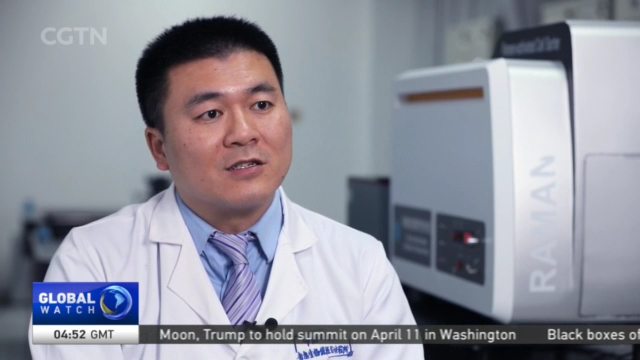
14:17, 30-Mar-2019
Combatting Superbugs: Cutting-edge technology helping to reduce antibiotic use
Updated
14:10, 02-Apr-2019
02:59

For nearly a century, antibiotics have been the treatment of choice for a host of deadly diseases. However, as time has gone by, viruses resistant to most antibiotics have become more and more prevalent globally. But now, Chinese scientists are working on ways to combat these so-called "superbugs". CGTN's Li Jianhua has more.
A micro-world. You're looking at bacteria that can cause diarrhea. These scientists are trying to extract some samples of these bacteria, the first step in the Raman-activated cell sorting technology. This little chip holds the key to this technology.
PROFESSOR MA BO QINGDAO INSTITUTE OF BIOENERGY & BIOPROCESS TECHNOLOGY "The most striking feature of the microfluidic chip is that we can concentrate tens of bacteria in the nanoliter liquid from the milliliter liquid. Also, we can extract single-cell bacteria more easily."
The traditional way to sort single cells is called fluorescence-activated cell sorting in which cells have to be fluorescently labeled and cultured, a time-consuming process.
The samples are then taken to be detected.
Under the microscope, samples are magnified many times. If the bacteria consume "heavy water" as usual in the presence of given antibiotics, it means the bacteria are resistant to them
LI YUANDONG QINGDAO INSTITUTE OF BIOENERGY & BIOPROCESS TECHNOLOGY "We can detect the virus in five seconds, and we can see the heavy water peak according to the spectrum. Now let's compare the spectra and see the prognosis. The result says this is E-coli. And it's resistant to the antibiotics we use."
This significantly shortens the time needed to test antimicrobial resistance from days to just hours.
PROFESSOR XU JIAN QINGDAO INSTITUTE OF BIOENERGY & BIOPROCESS TECHNOLOGY "It usually takes two to three days to test antimicrobial resistance. Many patients are not willing to or can't wait that long. When it comes to low-grade infections, some patients may use strong antibiotics; while some may take whatever antibiotics if they are seriously infected. For instance, patients with septicemia may die within eight hours if they are not given the right antibiotics. It's crucial to find a way to test antimicrobial resistance within hours."
Research indicates ten million people will die annually by 2050 if antimicrobial resistance continues to increase from current levels.
LI JIANHUA QINGDAO "In over 90 years of use, antibiotics remain one of the world's most popular ways to treat diseases and infections. This is especially true in China where you can buy them in any pharmacy with nearly any prescription from a doctor. Regulating the use of antibiotics is a big move for the country and for the world. LJH, CGTN, QINGDAO, SHANDONG PROVINCE."

SITEMAP
Copyright © 2018 CGTN. Beijing ICP prepared NO.16065310-3
Copyright © 2018 CGTN. Beijing ICP prepared NO.16065310-3